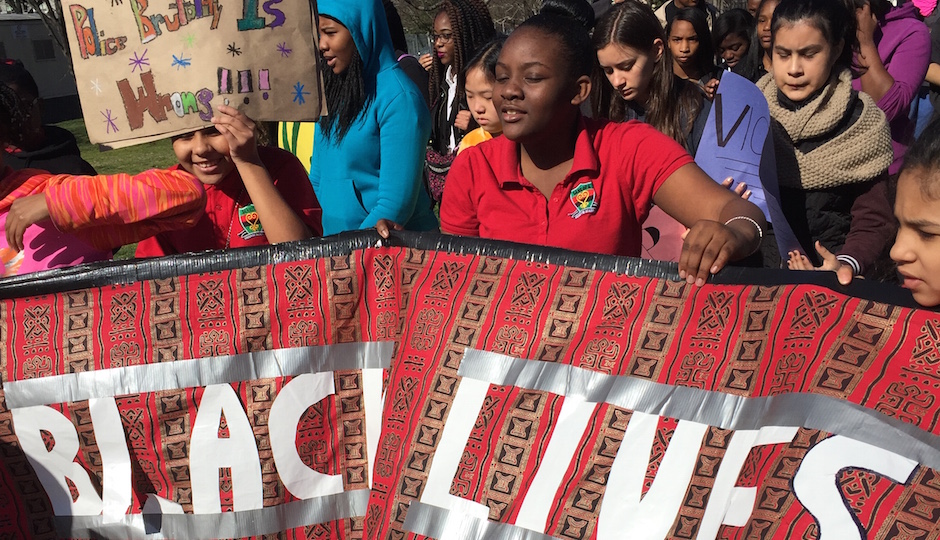Philadelphia Children Demand End to Excessive Force by Police

Photos by Brett Klein
Today, dozens of children marched from the steps of the Art Museum to City Hall in protest of excessive force by police. It was their second such rally in two years.
It was a silent march — as silent as children can be — with only the sound of a beating drum ringing out at the front of the line.
The event, organized by the Jubilee School in Philadelphia, included students and faculty from the Workshop School, Sankofa Freedom Academy Charter School, the Science Leadership Academy, Friends School Haverford, Masterman and Friends Select School.
The idea for the march came last year in the wake of the death of Freddie Gray while he was in police custody in Baltimore. A fifth-grade student thought the children could make a difference.
“We just had a meeting and one of the students, Samara, she said, you know, ‘They keep having all these protests and nothing changes,” principal and founder of the Jubilee School, Karen Falcon, said. “And she said, ‘I think we should have a children’s protest. Maybe they’ll listen to the children.’”
The students’ signs and posters on Friday contained powerful messages, most of which did not place blame on police, but instead called for a society in which there is more cohesiveness between police and the public.
One sign, which echoed a prominent point of the day, read, “Thank The Helpful Police. Indict The Violent Police.” The students were continually reminded, and said they understood themselves, that many police officers perform their jobs admirably.
“We have students that have parents who are police,” Falcon said. “We stress that this is not all about all police.”
Other messages students carried with them read, “Ban Stop and Frisk,” “Stop The Violence,” “Children Have A Voice,” and “Protect and Serve Not Shoot to Kill.”
At least one sign drew support from passing drivers, who honked in praise of the Black Lives Matter movement.
As they congregated in front of the Art Museum steps, students from the Jubilee School told Philly Mag why they were marching against excessive force by police.
Nine-year-old Jabril Nuriddin said he was marching because many people have “died innocent just because they was either colored or the cop just thought it was suspicious and didn’t know what was really going on.”
Tisah Davis, 10, said she and her classmates were protesting to “show how much we care and so we can stop police brutality.”
Their fourth-grade teacher, Nia Imani, says the march was a way to empower the students.
“When they feel like they can make a change, which they can, they’re more excited about being involved and putting their effort towards it and doing their best,” Imani said. “If they know that it’s going to affect their community and it’s affecting their population, then they’re excited to contribute to it.”
After trekking through the Center City streets with a police escort, students and faculty gathered in the Arch Street United Methodist Church for presentations from children as well as remarks from District Attorney Seth Williams and State Reps. Jordan Harris and Vanessa Lowery Brown.
Once everyone settled into their seats at the church, students took turns explaining what they expect of police, including that officers not use military weapons. Here’s their full list of demands:
After being invoked by the students, Williams took the podium. He told the audience about his days at Penn State, in which he said he, as president of the student government, organized a march from State College to Harrisburg — a 102-mile journey that took six days. His march was done to prompt Penn State to divest from South Africa in protest of apartheid.
“The world will only change when caring and committed people force it to change,” Williams said. “It’s not going to change on its own.”
He also said he has fought police corruption since becoming District Attorney in 2010. “We’ve prosecuted 90 police officers since I became D.A. in 2010 for the excessive use of force or for corruption, and that’s more than my predecessor did in her 19 years,” Williams said.
He added, “We’ve got about 6,500 police officers in Philadelphia, and most of them do a great job.”
After some more words from Harris, Lowery Brown and others, it was time for the children to head back to school. Falcon said she was satisfied with the day’s events.
“I was really happy with the turnout — really happy,” Falcon said. “And I was happy with the messages the children got. I think the way things are going on in the news, children are scared. They feel like adults are out of control, and it’s really powerful for them to know that … they have voices and that they can change things, that they can take hold of the future.”
Even though this was the march’s second year, Falcon said she didn’t know whether it would become an annual event.
“I don’t instigate these things. It’s the children,” she said. “I’m going to let them tell me. They’re activists.”
Follow @BretttKlein on Twitter.


